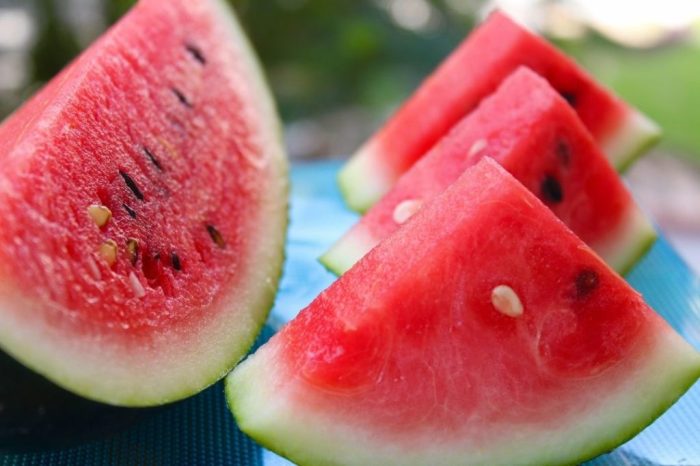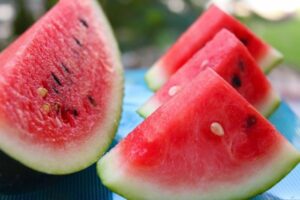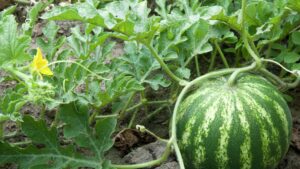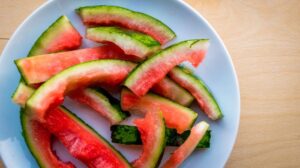Is watermelon vegetable – Is watermelon a vegetable? The answer to this seemingly straightforward question is surprisingly complex, as it involves both botanical definitions and culinary conventions. Join us on a journey to uncover the truth behind this juicy summer staple.
Botanically speaking, fruits are the mature ovaries of flowering plants that contain seeds. Vegetables, on the other hand, are all other plant parts, including roots, stems, leaves, and flowers. Based on this definition, watermelon would be classified as a fruit because it contains seeds.
Classification of Watermelon

Traditionally, watermelons have been classified as fruits due to their sweet taste and seed-bearing nature. However, in the realm of botany, the distinction between fruits and vegetables is not as straightforward as it may seem.
Indeed, the watermelon, a member of the Cucurbitaceae family, is a fruit despite its vegetal qualities. Its sweet, juicy flesh and refreshing properties make it a beloved summer treat. When it comes to harvesting this delectable fruit, timing is crucial.
Discover the signs that indicate the perfect moment to pluck your watermelons from the vine, ensuring their optimal flavor and texture.
Botanical Definition of Fruit and Vegetable
Botanically speaking, a fruit is a mature ovary of a flowering plant that contains seeds. Vegetables, on the other hand, are the edible parts of plants, such as roots, stems, leaves, or flowers, that do not contain seeds.
Is watermelon a vegetable? Technically, yes, but its sweet taste and juicy texture make it a fruit in our hearts. But what about our furry friends? Can guinea pigs enjoy this summer treat? Find out if watermelon is a safe and healthy snack for your beloved piggies here . And remember, moderation is key when introducing new foods to your pet’s diet.
Culinary Uses of Watermelon
Watermelon is a versatile fruit that can be enjoyed in various culinary applications. Its sweet and juicy flesh, refreshing rind, and crunchy seeds offer a range of culinary possibilities.
Watermelon, a refreshing and juicy summer staple, has long been a subject of culinary debate: is it a fruit or a vegetable? While some argue it’s a vegetable due to its classification as a member of the Cucurbitaceae family, others contend that its sweet, watery flesh and lack of culinary use as a vegetable make it more akin to a fruit.
Is watermelon a vegetable , or is it a fruit? The answer may lie in the way we define these culinary categories and how we choose to enjoy this versatile summer treat.
Flesh, Is watermelon vegetable
The juicy flesh of watermelon is the most commonly used part. It can be consumed fresh as a snack or dessert, providing a hydrating and refreshing treat. The flesh is also used in salads, smoothies, and fruit bowls, adding a burst of sweetness and hydration.
Rind
While less commonly used, the rind of watermelon has a distinct flavor and texture. It can be pickled or candied, creating a sweet and tangy treat. The rind is also used in some cultures to make jams, jellies, and preserves.
Seeds
Watermelon seeds are a nutritious snack. They can be roasted or dried and enjoyed as a crunchy treat. The seeds are also used in salads, granola bars, and baked goods, adding a nutty flavor and nutritional value.
Watermelons, often mistaken as fruits, are indeed vegetables, belonging to the family of Cucurbitaceae. This refreshing summer treat is not only a favorite among humans but also among our feathered friends. Chickens, known for their omnivorous nature, can safely enjoy the sweet flesh of watermelons.
So, the next time you’re indulging in this juicy delicacy, don’t forget to share a slice with your clucking companions. You can find more information on how to feed watermelons to chickens at can chickens eat watermelon .
Nutritional Value of Watermelon

Watermelon is a highly nutritious fruit, offering a wealth of essential vitamins, minerals, and antioxidants. It is low in calories and high in water content, making it a refreshing and hydrating choice.
Nutritional Composition
The nutritional composition of watermelon per 100 grams is as follows:
- Calories: 30
- Water: 92%
- Carbohydrates: 7.6 grams
- Protein: 0.6 grams
- Fat: 0.2 grams
- Fiber: 0.4 grams
Vitamins and Minerals
Watermelon is a rich source of several vitamins and minerals, including:
- Vitamin C: A powerful antioxidant that supports immune function and collagen production.
- Vitamin A: Essential for vision, immune system, and cell growth.
- Potassium: An electrolyte that regulates fluid balance and blood pressure.
- Magnesium: A mineral that supports muscle and nerve function.
- Iron: Essential for red blood cell production.
Antioxidants
Watermelon contains a range of antioxidants, including lycopene, beta-carotene, and vitamin C. These antioxidants help protect the body from damage caused by free radicals, which are linked to chronic diseases such as cancer and heart disease.
Comparison to Other Fruits and Vegetables
Compared to other fruits and vegetables, watermelon has a relatively low calorie and sugar content. It is a good source of vitamin C, potassium, and lycopene, which are not as abundant in many other fruits and vegetables.
Cultural Significance of Watermelon

Watermelon has played a significant role in the cultures of various regions worldwide. Its historical and cultural significance stems from its refreshing taste, nutritional value, and versatility.
Africa
Watermelon is native to Africa and has been cultivated there for centuries. In many African cultures, it is a symbol of fertility, abundance, and hospitality. It is often served at weddings, funerals, and other important gatherings.
Watermelon Cultivation and Production
Watermelon cultivation involves specific growing conditions and cultivation practices to produce the large, juicy fruits. The optimal conditions for watermelon growth include warm temperatures, well-drained soil, and ample sunlight.
Though the sweet flesh of watermelons might conjure images of fruits, they are indeed members of the vegetable family. Their lifespan, like their unique botanical status, is an intriguing aspect to consider.
Wondering how long these juicy wonders can grace our presence? Discover the secrets of watermelon longevity at how long do watermelons last . Embark on a culinary journey where the lines between fruits and vegetables blur, and the mysteries of watermelon preservation unfold.
Watermelons are typically grown from seeds planted directly in the ground. The seeds are sown in hills or rows, and the seedlings are thinned out as they grow. Watermelons require regular watering, especially during the hot summer months. They also need to be fertilized regularly to ensure healthy growth and fruit production.
Major Watermelon-Producing Regions
Watermelons are grown in many parts of the world, but the major producing regions include:
- China: China is the world’s largest producer of watermelons, accounting for over half of the global production.
- United States: The United States is the second-largest producer of watermelons, with major production areas in California, Florida, and Texas.
- Turkey: Turkey is the third-largest producer of watermelons, with a significant portion of its production exported to Europe.
- Iran: Iran is another major producer of watermelons, with a large domestic market and exports to neighboring countries.
- India: India is a major producer and consumer of watermelons, with production concentrated in the southern and western parts of the country.
Closing Summary
In conclusion, whether watermelon is considered a vegetable or a fruit depends on the context. Botanically, it is a fruit due to its seed-bearing nature. However, in culinary terms, it is often treated as a vegetable due to its savory flavor and versatility in savory dishes. Ultimately, the classification of watermelon is a matter of perspective and usage, and both interpretations have their own merits.
General Inquiries: Is Watermelon Vegetable
Is watermelon a good source of vitamins?
Yes, watermelon is rich in vitamins A, C, and B6, as well as minerals like potassium and magnesium.
Can watermelon help with hydration?
Yes, watermelon is over 90% water, making it an excellent choice for staying hydrated during hot weather.
Is watermelon rind edible?
Yes, watermelon rind can be eaten raw, pickled, or cooked. It is a good source of fiber and nutrients.







Leave a Comment